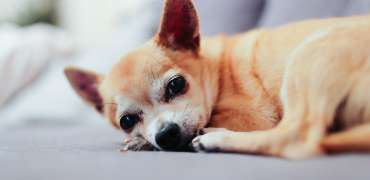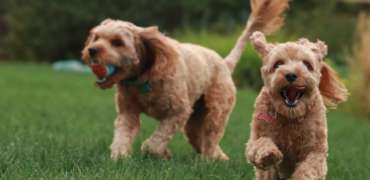Why Do Old Dogs Smell? How To Care for a Senior Dog and Keep It Smelling Fresh
If you've been around senior dogs, one of the questions you've likely asked is, "Why do old dogs smell so bad?" With an estimated 28% of America's dogs being seniors, it's something that comes up for a lot of pet owners. While most dogs have a certain doggie smell, senior dogs tend to become even stinkier as they age.
So, what can pet parents do when caring for older dogs? Besides dealing with pet hearing loss, heart disease, arthritis and other joint diseases, part of knowing how to care for a senior dog is addressing the issues that make them smell horrible. This article will go over the basics of why your old dog smells bad and show you how to keep a geriatric dog smelling good.
What Is a Senior Dog?
Why Do Old Dogs Smell Worse Than Young Dogs?
Jump to SectionSenior Pet Care Tips to Keep Dogs Smelling Good
Jump to Section
What Is a Senior Dog?
Senior dogs are canines in their golden years — the exact age depends on the breed and size. Larger dogs, like Great Danes or Golden Retrievers, typically age quicker than small breeds.
Here are some general guidelines for senior dog ages:
- Small breeds: 10-12 years of age
- Medium breeds: 10-11 years of age
- Large breeds: 8-9 years of age
- Giant breeds: 6-7 years old
Besides the dog's age and size, the speed of the aging process depends on their veterinary care, diet, body weight and breed.
Why Do Old Dogs Smell Worse Than Young Dogs?
Woof! What's that smell? As dogs age, there are a number of reasons why they start to smell ruff. From bad breath to funky fur, aging dogs can really reek. Foul canine body odor is annoying, but when an old dog smells bad, it can be a sign of serious problems with your pet's health. Here are some of the most common age-related health issues in elderly dogs and some suggestions on how to improve their funk.
Senior Dog Dental Care
Puppy breath isn't exactly fresh, but senior dog bad breath is next-level fur-ocious. It's one of the not-so-subtle signs that something serious could be happening in their mouth. Dental decay, periodontal disease and tooth loss all create halitosis that will make you howl. Senior dog care should include regular dental checkups to inspect the dog's teeth because many require tooth extractions to address the stench. Dental treats are a tasty substitute if your grumpy, elderly dog won't tolerate brushing.
Incontinence in Senior Dogs
Caring for elderly dogs often includes dealing with accidents. Incontinence in senior dogs can be caused by health problems that are a natural process of aging, stress or senility, causing your older dog to forget their house training.
Senior dog care tips for incontinence include:
- Taking your dog out more frequently
- Keeping the fur trimmed around your senior dog's private parts
- Providing more frequent baths using extra-gentle pet shampoos to avoid irritating the skin
- Feeding dog food designed for seniors to prevent weight gain
- Considering prescription drugs or dog diapers for extreme cases
Absorbent bedding and machine washable orthopedic beds are helpful for caring for older pets. Pet parents should never deprive their senior dog of water to prevent incontinence because it could negatively impact the dog's health.
Poor Self-Grooming
An overweight or arthritic dog may have mobility issues and struggle with normal personal upkeep. When your old dog smells bad, it may be because of a lack of self-care. Pet parents can snuff out old-age odors that result from poor grooming habits by enhancing their elderly dog care routine. Wipe your older dog's eyes and face to reduce secretions, make sure that there isn't poop stuck to their rump after they go outside and brush and bathe senior dogs more frequently to give them a helping hand.
Senior Dog Skin Issues
Dermatitis and allergies not only cause discomfort for your elderly dogs, but they can also create an odor problem. When they lick their fur with stinky breath, the smell lingers. Plus, wet dog fur is a breeding ground for smelly bacteria. Treating allergies or skin conditions will dramatically reduce old dog smells and bad odors in your home. Talk to your veterinarian about how to care for a senior dog's skin issues. Solutions may include dietary changes, pet medications or lifestyle changes that are appropriate when caring for elderly dogs.
Underlying Age-Related Conditions
Many times, age-related ailments can make an old dog smell bad. When you are trying to figure out why old dogs smell, a trip to the vet is an integral part of the senior dog care process. Impacted anal glands can cause a fishy smell and scooting. Diabetes, kidney and liver disease commonly arise when caring for older dogs. High glucose levels in the blood from diabetes cause bad breath that can have a sweet smell. Kidney disease can also cause stinky breath.
Senior Pet Care Tips to Keep Dogs Smelling Good
So now that you've discovered some answers to the question, "Why does my old dog smell so bad?" let's talk about ways to help keep your furry friend fresh.
- Provide a healthy senior dog diet for overall wellness.
- Maintain oral health to prevent bad breath related to dental disease.
- Schedule regular grooming for haircuts, baths and anal gland care.
- Use GotDog dog deodorant for the ultimutt long-lasting smell enhancer.

Support Odor-Reducing Senior Dog Care With GotDog
If you are a pet parent, don't just ask, "Why do old dogs smell?" — do something about it! Caring for senior dogs doesn't have to be hard. Purchasing designer dog cologne at GotDog.com is a wonderful way to help your best friend smell their very best in their senior years, and improve your quality of life, too. Add GotDog to your senior dog care routine today!
Shop the Best Dog Deodorizing Spray




